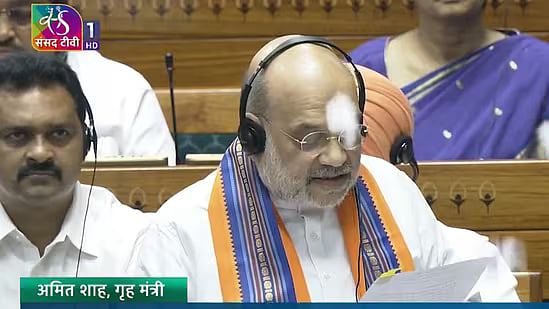FPJ Analysis: Constitution (130th) Amendment Bill Sparks Row, Opposition Sees Threat To Federalism And Democracy
The bill, which was introduced by home minister Amit Shah out of the blue and in violation of parliamentary rules.

Constitution (130th) Amendment Bill Sparks Row: Opposition Sees Threat To Federalism, Democracy | You tube/ Sansad TV
The Constitution (130th) Amendment Bill introduced by the BJP government in Lok Sabha on Wednesday is a proposed law which is fraught with danger for Indian democracy. The bill, which was introduced by home minister Amit Shah out of the blue and in violation of parliamentary rules. According to reports, Shah cited "paucity of time" to request the secretary-general to go easy on rule 19 (a) and 19 (b) to ensure the introduction of the bill and that too when the monsoon session is scheduled to end a day later.
Opposition Raises Alarm
Rule 19 (a) mandates that the minister concerned should give prior notice before seeking to introduce a bill and Rule 19 (b) calls for the circulation of the bill to all members before it is formally introduced. Both these rules were given the go by which underlies the government eagerness to have the law passed.
Not unsurprisingly the opposition smelt a big rat and said the bill was an insidious legislation to unseat opposition ruled state governments and remove inconvenient chief ministers and ministers. The fact that it is applicable to the prime minister as well does not hold much water.
As per the bill, in Article 75 after clause (5), Clause 5 (A) shall me inserted and it says that a minister ``who for any period of 30 consecutive days .....is arrested and detained in the custody on allegatio of committing an offence under any law for the time being in force which is punishable with imprisonment for a term which may extend to five years or more shall be removed from his office by the President on the advice of the PM by the thirty first day, after being taken in such custody." This is for central ministers.
In article 164 after clause (4) a clause (4 a) shall be inserted and it deals similarly with ministers at the state level where the governor may remove a minister on the advice of the chief minister. If the CM does not make such a recommendation by the 31st day then the minister will ipso facto cease to be a minister.
Offences which entail punishment of five years and more include murder, rape, dacoity with murder, POSCO violations etc.
Applicability to Prime Minister Questioned
Though the intention appears to be laudable in that the bill seeks to ensure that ministers and CMs facing serious criminal charges should not be allowed to hold office, in real terms it becomes a powerful weapon in the hands of the ruling party to decimate the opposition. Nothing prevents an investigating agency from arresting a minister or CM on trumped up charges and keeping him or her in custody for 30 days after which the persons concerned will lose his or her ministership. It is not that a minister has to be convicted. Mere detention for a month can remove an inconvenient minister from his post. This is nothing but the short circuiting of the laws of the land to browbeat the opposition. The fact that the bill is applicable to the Prime Minister also does not carry much weight because the question is which agency will have the daring to arrest a prime minister?
Federalism at Risk
The bill seeks to introduce Emergency through the back door and makes perfect nonsense of the spirit of federalism. On the face of it the proposed law is ultra vires of the Constitution.
RECENT STORIES
-
-
-
-
-